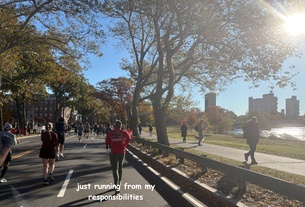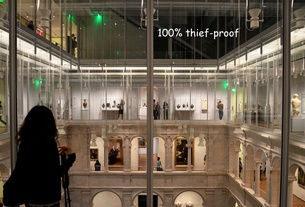The Red Line
Harvard in the 75th Percentile
Like 4,600 other members of the Harvard Union of Clerical and Technical Workers, the WGS coordinator has been working without a wage raise since June 2011. Sadly, Harvard's ongoing negotiations with its clerical workers demonstrate a fundamental lack of respect for the people who make Harvard run. Whether negotiations focused on health care, size of the bargaining unit, or wages, Harvard has sent the signal that respecting workers' time and lives is not a top priority for our university.
Go Forth To Serve
It’s well known that Harvard students disproportionately go on to work in investment banking and consulting after graduation. This fact has caused consternation to everyone from New York Times blogger Catherine Rampell to Occupy Harvard to Ezra Klein. But in recent years, the Ivy-to-Wall-Street pipeline seems to have slowed: The percentage of Harvard students who reported going into consulting or investment banking after graduation has declined from 47 percent in 2007, to 39 percent in 2008, to only 22 percent in 2011, according to The Crimson’s annual senior survey. There are many possible explanations for this: Perhaps the financial sector seemed less attractive after the financial crisis of 2008; perhaps the encouragement of Harvard administrators and student activists has actually paid off.
How to Make a Responsible Endowment
Yet, one important detail of Harvard’s announcement has thus far been largely overlooked. Although Harvard will create a Social Choice fund on July 1, this fund will not be part of Harvard’s $31 billion endowment and the Harvard Management Company will not manage it. Instead, Harvard has cleverly maintained the position of its endowment as removed from moral or ethical considerations. Members of the Harvard community must keep working if they truly want our university to use its money responsibly.
The 'Cliffe Girl, 60 Years Later
This story is fascinating because it is both unfamiliar and very familiar. Students at Harvard today read about outmoded concepts of gender from sixty years ago and laugh—isn’t it silly that professors thought women “rarely brilliant,” or that Harvard was so concerned about teaching fellows marrying their students that it would not let unmarried men teach sections of women? Yet 1953 was not all that long ago, and I think it’s important that we not brush aside the lessons of history.
Forgetting Barry’s Corner
Harvard broke ground on the Science Complex in 2008 while pledging to give back to the Allston community by turning Allston’s Barry’s Corner into a vibrant neighborhood. Unfortunately, when Harvard’s endowment plummeted during the financial crisis, the University decided to halt construction on the Science Complex indefinitely. The building’s foundation has sat basically untouched in the middle of Allston since 2009. A post in Boston’s community news site Universal Hub ironically notes, “Harvard is listening to residents not looking forward to a decade of living near a crater” by proposing that attractive bushes be planted around the site. To further compensate Allston residents for the revenue lost by their community, Harvard has kindly erected a miniature golf course and provided rat-proof trash cans to Allston residents. How generous.




